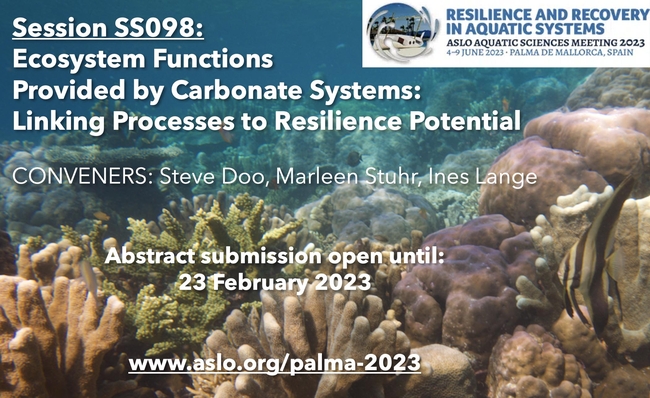20/01/2023 | On 4–9 June 2023, the Association for the Science of Limnology and Oceanography (ASLO) organizes the ASLO Aquatic Sciences Meeting 2023 in Palma de Mallorca, Spain. The organizers incorporate the theme of the meeting, Resilience and Recovery in Aquatic Systems, into the sessions and encourage submissions that examine these topics. The meeting will be in-person with a small virtual component for those unable to travel to Spain.
At the ASLO meeting, scientists from the ZMT will also offer sessions in cooperation with partners and invite you to contribute to their sessions. The abstract submission is open:
SS098 Ecosystem Functions Provided by Carbonate Systems: Linking Processes to Resilience Potential
Steve Doo, King Abdullah University for Science and Technology
Marleen Stuhr, Leibniz Centre for Tropical Marine Research
Ines Lange, University of Exeter
The geo-ecological functioning of carbonate systems such as tropical coral reefs and temperate calcifying algae realms relies on the balance between rates of carbonate production, erosion, and transport. These processes drive reef-framework construction and sediment generation, and thus influence the maintenance of habitat complexity and the potential to sustain nearby lagoons, beaches and islands.
Through a variety of ecological, physical and chemical processes, carbonate systems are also tightly interconnected with adjacent ecosystems and habitats such as seagrass meadows, indicating the importance of connectivity of carbonates between these distinct ecosystems. However, the accelerating pace of ecosystem degradation, increasing seawater temperatures and ocean acidification are significantly decreasing the capacity of carbonate systems to sustain their geo-ecological functioning. At the same time, environmental changes influence the connectivity both within and between ecosystems, likely altering the physical structures (geomorphology) over larger reef-scales.
To understand how recent and future environmental changes impact ecosystem functioning of carbonate systems and their spatio-temporal connectivity, a clearer view of the various integrative processes contributing to geo-ecological functioning (e.g., rates of carbonate production, erosion, transport, deposition, dissolution) is needed.
For this session, we invite contributions that explore the geo-ecological interface seeking to understand how anthropogenic changes may alter functioning of carbonate systems. Specifically, we invite studies that address questions of:
- how rates of carbonate framework and sediment production and erosion are influenced by environmental conditions,
- how changes in the abundance of carbonate producers (e.g., corals, calcifying algae, foraminifera) and bioeroders (fishes, urchins, sponges, molluscs, worms, microendoliths) impact habitat complexity, reef growth, sediment production, and transport,
- the implications of anthropogenic changes for the functioning and connectivity of carbonate systems, and
- how reef management and restoration efforts can strengthen resilience of these important ecosystems. We also welcome contributions that discuss novel methodologies to quantifying geo-ecological functions of carbonate systems and the biogeochemical processes that connect organisms and/or habitats over different spatial scales.





